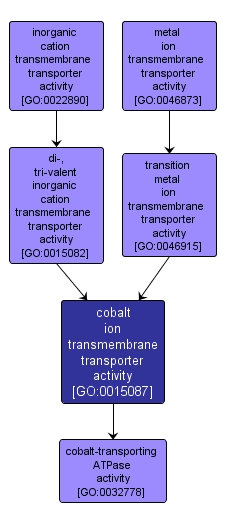GO TERM SUMMARY
|
| Name: |
cobalt ion transmembrane transporter activity |
| Acc: |
GO:0015087 |
| Aspect: |
Molecular Function |
| Desc: |
Catalysis of the transfer of cobalt (Co) ions from one side of a membrane to the other. |
Synonyms:
- zinc, cadmium, cobalt, nickel, lead-efflux ATPase activity
- cobalt, zinc uptake permease activity
|
|

|
INTERACTIVE GO GRAPH
|














